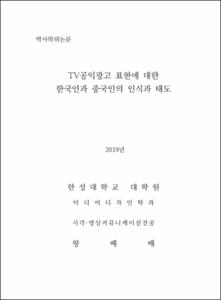TV공익광고 표현에 대한 한국인과 중국인의 인식과 태도
= Korean and Chinese Perceptions and attitudes toward TV Public service advertisements
- Type
- Thesis
- Advisor
- 명광주
- Department
- 대학원 미디어디자인학과
- Issued Date
- 2019
- Publisher
- 한성대학교 대학원
- Keyword
- TV공익광고; 한국과 중국인의 TV공익광고 인식; 한국과 중국인의 TV공익광고 태도
- Files in This Item:
-
-
Download
 200000216804.pdf
기타 데이터 / 4.01 MB / Adobe PDF
200000216804.pdf
기타 데이터 / 4.01 MB / Adobe PDF
-
Items in Repository are protected by copyright, with all rights reserved, unless otherwise indicated.